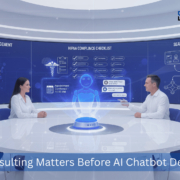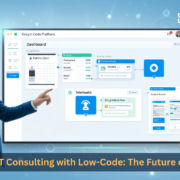Why Healthcare Businesses Need IT Consulting Before Jumping into AI Chatbot Development
In today’s fast-moving digital healthcare landscape, many hospitals, clinics, and health tech startups are eager to adopt AI chatbot development. The promise is appealing—24/7 patient engagement, reduced administrative burden, and instant responses that improve customer satisfaction. However, rushing into chatbot adoption without proper planning often backfires. Healthcare providers face challenges like data privacy risks, system integration failures, and wasted investments when chatbots don’t align with their workflows.
This is where healthcare IT consulting services play a critical role. Instead of treating chatbots as a quick-fix solution, IT consulting ensures that businesses integrate them strategically, securely, and effectively. By combining healthcare IT consulting with chatbot development services, organizations can maximize both patient outcomes and business value.
The Rush Toward AI Chatbots in Healthcare
Healthcare businesses are under increasing pressure to deliver better patient experiences at lower costs. AI chatbots offer multiple advantages:
- Handling appointment scheduling without human intervention.
- Offering symptom-checking and triage guidance.
- Automating billing and insurance queries.
- Delivering AI customer support that reduces wait times.
According to industry reports, chatbot automation in healthcare is growing rapidly, with billions expected to be invested in the coming years. Yet, many healthcare providers make the mistake of skipping the consulting stage and rushing directly into chatbot development. Without the right foundation, even advanced chatbots can fail to deliver.
The Hidden Risks of Skipping IT Consulting
Healthcare organizations that dive into chatbot development services without consulting often encounter challenges such as:
- Compliance Pitfalls
Regulations like HIPAA, GDPR, and other regional healthcare laws demand strict handling of sensitive patient data. A chatbot that isn’t designed with compliance in mind exposes organizations to legal and financial risks. - Integration Failures
A chatbot should not function in isolation. It must seamlessly integrate with EHR/EMR systems, telehealth platforms, and billing software. Without healthcare IT consulting, organizations often discover too late that their chatbot cannot sync with existing healthcare IT solutions. - Scalability Issues
Businesses need chatbots that can handle thousands of patient queries at once. Skipping consulting leads to poor scalability planning, forcing companies to reinvest in upgrades later. - Poor User Experience
An AI chatbot that doesn’t reflect the workflows of doctors, nurses, or administrative staff can frustrate patients instead of helping them. Consulting ensures alignment between business operations and chatbot design.
The Role of Healthcare IT Consulting Services in Chatbot Success
Healthcare IT consulting companies help bridge the gap between technology and real-world business needs. Their expertise ensures that chatbot development isn’t just a technical project but a strategic business initiative.
Key contributions of healthcare IT consulting include:
- Strategic Alignment: Consultants work with healthcare leaders to ensure chatbot use cases align with overall business goals, such as improving patient satisfaction or reducing call center costs.
- Technology Assessment: They evaluate the right platforms, APIs, and chatbot development company partnerships to ensure compatibility with existing IT infrastructure.
- Compliance and Security: IT consultants guide organizations through the complex regulations governing patient data, ensuring chatbots meet legal standards.
- Workflow Optimization: Beyond technology, consulting helps optimize processes so chatbots complement rather than complicate operations.
With proper healthcare IT services, organizations avoid wasted investments and launch chatbots that deliver real value.
How IT Consulting and AI Chatbot Development Work Together
Instead of viewing healthcare IT consulting and AI chatbot development as separate efforts, businesses should see them as interconnected stages of digital transformation.
The journey often looks like this:
- Consulting Assessment – Identifying patient pain points, business challenges, and compliance requirements.
- Use Case Definition – Deciding whether the chatbot will manage appointments, triage patients, or provide AI customer support.
- Development & Customization – Partnering with a chatbot development company to design a chatbot tailored for healthcare needs.
- Integration & Testing – Ensuring smooth integration with healthcare IT solutions like EHR and telehealth systems.
- Continuous Improvement – Using consulting support to refine chatbot automation and adapt to changing regulations or business needs.
When healthcare IT consulting services and AI chatbot development services work hand in hand, businesses reduce risks and increase long-term success.
Real-World Business Benefits
For healthcare organizations, combining consulting and development leads to measurable business advantages:
- Cost Efficiency: Chatbots reduce administrative workloads, allowing staff to focus on high-value care.
- Improved Patient Experience: Patients appreciate instant access to services like free AI chatbot symptom checkers or real-time support.
- Faster ROI: With consulting ensuring proper strategy, businesses see quicker returns on their investment in chatbot development.
- Competitive Advantage: Healthcare providers with smart chatbot automation gain an edge in patient acquisition and retention.
These benefits go beyond technology—they reshape business models and strengthen healthcare organizations for long-term growth.
A Practical Example
Imagine a mid-sized hospital that invested in an AI chatbot without consulting. The chatbot couldn’t connect with their EHR system, failed HIPAA compliance audits, and frustrated patients with generic responses. After turning to healthcare IT consulting, the hospital redefined its chatbot strategy, integrated with telehealth systems, and improved workflows. Within six months, patient engagement increased by 40%, and administrative calls dropped significantly.
This illustrates why healthcare IT consulting companies are not just optional—they’re essential partners in digital transformation.
The Future Outlook: Consulting as the Bridge to AI-Powered Healthcare
As AI chatbot development services becomes more advanced, healthcare businesses will face even greater complexity. Next-generation chatbots may integrate with wearables, predictive analytics, and generative AI for highly personalized care. Without healthcare IT consulting services to guide this evolution, businesses risk falling behind or making costly mistakes.
In the future, the most successful healthcare organizations will be those that combine strong IT consulting with trusted AI chatbot development companies to create sustainable, secure, and scalable solutions.
Conclusion
Jumping directly into chatbot development without proper consulting is a recipe for inefficiency and risk. Healthcare IT consulting provides the strategy, compliance knowledge, and technical foundation needed to ensure chatbots succeed. From workflow optimization to secure integration with healthcare IT solutions, consulting services make the difference between a chatbot that frustrates and one that transforms patient care.
For healthcare businesses looking to adopt AI chatbots, the smartest move is to partner with both a reliable healthcare IT consulting company and a skilled AI chatbot development company. This dual approach ensures that your investment leads to improved patient experiences, stronger compliance, and real business growth.
Dreamsoft4u, with its proven expertise in healthcare IT consulting services and AI chatbot development, helps organizations bridge the gap between strategy and execution. By partnering with Dreamsoft4u, healthcare providers can confidently embrace digital transformation, achieve compliance, and deliver patient experiences that set them apart in a competitive market.


